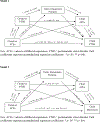Implications of intergenerational trauma: Associations between caregiver ACEs and child internalizing symptoms in an urban African American sample
- PMID: 35901424
- PMCID: PMC10191152
- DOI: 10.1037/tra0001334
Implications of intergenerational trauma: Associations between caregiver ACEs and child internalizing symptoms in an urban African American sample
Abstract
Objective: The link between adverse childhood experiences (ACEs) and negative mental health outcomes is well established. However, the intergenerational link between caregiver ACE history and their child's psychosocial outcomes is understudied, particularly within minoritized groups. This study aimed to delineate relations between caregiver ACE exposure and their child's depression and posttraumatic stress disorder (PTSD) symptoms by proposing a serial mediation of caregiver PTSD, family management problems, and child ACEs.
Method: Two hundred seventy-three caregiver (Mage = 39.27; 88% female) and adolescent (Mage = 14.26; 57% female) dyads from low-income urban communities completed electronic questionnaires measuring PTSD symptoms and ACEs. Child participants also completed a measure of depression and family management problems. Regression and serial mediation analyses were conducted to examine associations among these variables.
Results: Caregiver ACEs were significantly associated with their child's PTSD symptoms but were not related to their child's depression scores. Serial mediation analyses indicated that child ACEs mediated the relation between caregiver ACEs and their child's PTSD symptoms. Evidence for an overall indirect effect via caregiver PTSD, family management problems, and child ACEs was not found. No indirect effects between caregiver ACEs and child depression were found.
Conclusions: Findings demonstrate that higher levels of caregiver ACE exposure are associated with their child's PTSD symptoms in a sample of African American dyads living in urban, high-burden communities. These results suggest a need for ACE screening during medical visits and provides guidance for future clinical interventions. The distinct intergenerational consequences for caregivers with ACEs and their children's psychosocial wellbeing warrant further study. (PsycInfo Database Record (c) 2023 APA, all rights reserved).
Conflict of interest statement
We have no known conflict of interest to disclose.
Figures
Similar articles
-
Adverse childhood experiences and prenatal mental health: Type of ACEs and age of maltreatment onset.J Fam Psychol. 2019 Apr;33(3):304-314. doi: 10.1037/fam0000510. Epub 2019 Feb 25. J Fam Psychol. 2019. PMID: 30802085
-
Caregiver and Child Adverse Childhood Experiences: A Meta-Analysis.Pediatrics. 2025 Feb 1;155(2):e2024068578. doi: 10.1542/peds.2024-068578. Pediatrics. 2025. PMID: 39804186
-
Parental Adverse Childhood Experiences and Post-PICU Stress in Children and Parents.Pediatr Crit Care Med. 2023 Dec 1;24(12):1022-1032. doi: 10.1097/PCC.0000000000003339. Epub 2023 Aug 21. Pediatr Crit Care Med. 2023. PMID: 37615404
-
Intergenerational transmission and prevention of adverse childhood experiences (ACEs).Clin Psychol Rev. 2021 Apr;85:101997. doi: 10.1016/j.cpr.2021.101997. Epub 2021 Feb 28. Clin Psychol Rev. 2021. PMID: 33689982 Review.
-
Five hypothesized biological mechanisms linking adverse childhood experiences with anxiety, depression, and PTSD: A scoping review.Neurosci Biobehav Rev. 2025 Apr;171:106062. doi: 10.1016/j.neubiorev.2025.106062. Epub 2025 Feb 12. Neurosci Biobehav Rev. 2025. PMID: 39952339
References
-
- Aufrichtig A, Beckett L, Diehm J, & Lartey J (2017). CDC WONDER Database. Retrieved from https://efsgv.org/learn/type-of-gun-violence/community-gun-violence/
-
- Becker J, Greenwald R & Mitchell C (2011). Trauma-Informed Treatment for Disenfranchised Urban Children and Youth: An Open Trial. Child Adolesc Soc Work J 28, 257–272. 10.1007/s10560-011-0230-4 - DOI
MeSH terms
Grants and funding
LinkOut - more resources
Full Text Sources
Medical
Miscellaneous


